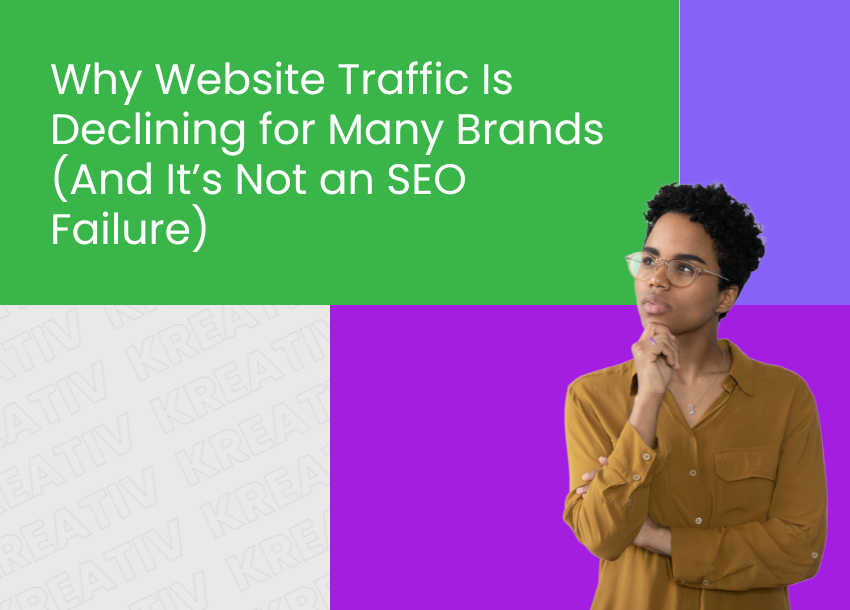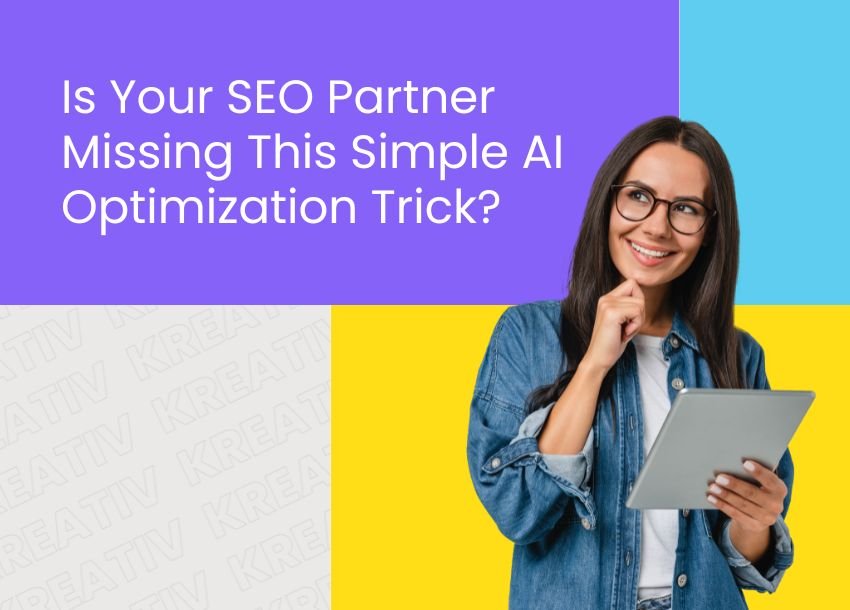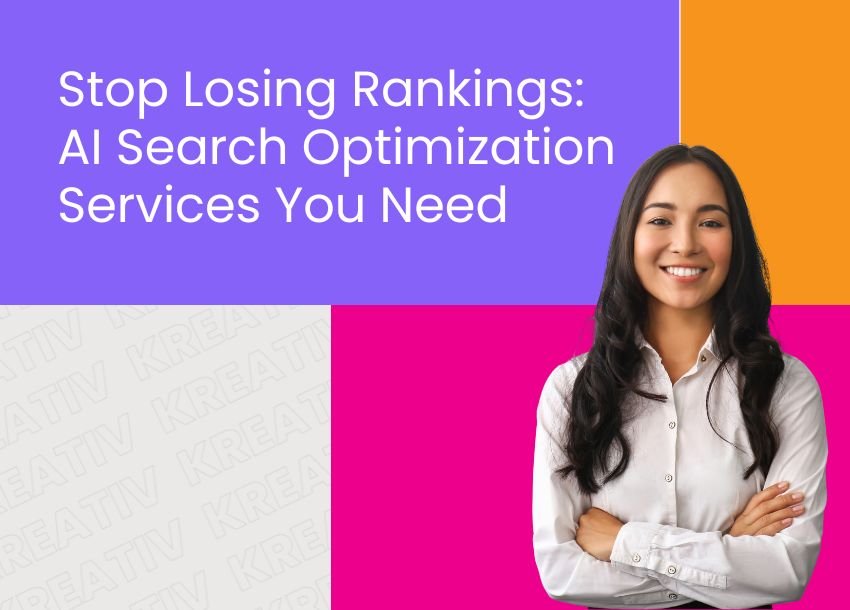60% of high-intent search traffic in 2025 never reaches your website, it’s answered by AI. That’s the new SEO reality. AI-powered search tools like ChatGPT, Perplexity, and Google’s SGE now intercept a massive chunk of queries. If your brand isn’t recognized as an authority across these models, your content isn’t just underperforming, it’s invisible.
AI hasn’t just disrupted traditional SEO services, it’s made them obsolete.
Search engines now operate on machine learning algorithms that evaluate context, user intent, and behavioral data in real-time. If your SEO agency or in-house team hasn’t evolved accordingly, your visibility, traffic, and pipeline are already suffering.
Let’s break down exactly how AI has transformed the landscape, and what your enterprise must do now to stay relevant, competitive, and future-proof.
Traditional SEO Is Dead: Here’s Why
In the pre-AI era, most SEO service providers followed a playbook that was tactical, slow, and often reactive:
- Keyword stuffing
- Over-optimized metadata
- Chasing backlinks over content quality
- Publishing thin blog content just to “rank”
- Static technical audits once a quarter
These methods might have worked a few years ago. But now?
They’re actively harming your growth.
Search engines today are smart enough to detect manipulation. They’re not just parsing words, they’re analyzing meaning, context, and engagement across devices, languages, and platforms. And with AI models like MUM and Gemini powering the core of modern SERPs, outdated SEO strategies are completely ineffective.
The AI-Driven SEO Shift: What Really Works in 2025
To thrive in this new landscape, SEO strategies must evolve into intelligent systems of growth. Here’s what the best-performing teams are doing now:
1. Search Experience Optimization (SXO)
AI rewards total experience, not just keyword relevance. That means your SEO team needs to be obsessed with UX, page speed, accessibility, mobile fluidity, and how users interact with your site.
Forget ranking pages that don’t convert or engage. SXO focuses on:
- Task completion rates
- Scroll depth and dwell time
- Click-to-conversion velocity
- Intent-aligned internal linking
2. Generative Content at Scale (But With Guardrails)
AI allows you to scale content faster, but only if done right. Top-performing companies are using tools like ChatGPT, Jasper, and ContentShake to generate outlines, adapt tone, and localize messaging, but always under human editorial guidance.
What works now:
- Semantic content clusters aligned with buyer journeys
- Dynamic landing pages that adapt by persona and behavior
- Personalized copy based on CRM/intent data integrations
3. Predictive SEO with AI Forecasting
AI SEO isn’t just about reacting to algorithms. It’s about predicting them.
Enterprise SEO tools now use machine learning to:
- Forecast ranking volatility
- Suggest next-best content opportunities
- Predict SERP layout changes
- Automate A/B testing of titles and CTAs
If your SEO agency isn’t providing real-time insight plus future-focused intelligence, you’re stuck in the past.
4. Conversational & Multimodal Search Optimization
With voice, image, and video search dominating mobile, the new SEO is multimodal.
What this means:
- Optimizing for voice queries and zero-click answers
- Structuring video transcriptions for indexability
- Ensuring visual alt-text and tagging matches real-world user language
In 2025, a static text-only SEO strategy is a liability.
5. Connected Data Layer for Full-Funnel Attribution
SEO no longer operates in isolation. It’s deeply integrated with:
- Marketing automation (e.g., HubSpot, Marketo)
- Sales intelligence (e.g., ZoomInfo, Gong)
- Product analytics (e.g., Mixpanel, GA4)
- Revenue reporting
AI lets you connect the dots between a search session and a sales win. If your agency can’t prove this ROI, it’s time to replace them.
Not feeling like reading? Listen about this topic in Podcast.
How AI SEO Rewrites the Role of Agencies
Hiring an SEO agency today isn’t just about outsourcing tasks. It’s about onboarding a growth partner with AI-native capabilities.
Here’s what a winning agency looks like in 2025:
- AI-first stack: Uses tools like Surfer AI, Semrush AI, ContentKing, and GA4 predictive modeling
- Cross-functional teams: Combines data science, UX, content, and CRO
- Strategy-led: Doesn’t just “optimize pages,” but builds systems for compounding traffic and conversions
- Revenue-focused: Ties SEO actions directly to SQLs, CAC, and pipeline velocity
- Localized: Can support multi-market, multi-language campaigns in GCC, APAC, and beyond
The days of hiring “SEO guys” for a monthly blog and a backlink package are over.
What You Should Do Right Now
If you’re serious about driving scalable organic growth in 2025, here’s your playbook:
- Audit your current SEO agency or team
Are they using AI-first tools? Do they understand SXO, not just SEO? - Re-align on business outcomes, not vanity metrics
Stop chasing rank #1. Start chasing revenue per visitor and LTV. - Invest in cross-functional capability
Ensure SEO, product, design, and data teams are aligned under shared goals. - Choose AI-native partners, not legacy vendors
Look for SEO providers who build content systems, not just pages.
How kreativ street did AI SEO right : Case Studies
1. Scaling Organic Traffic and Leads for a Digital Security Company
The Objective
Increase organic traffic and drive inbound leads in a high-competition, compliance-sensitive industry.
The Solution
- Conducted in-depth keyword research focused on geo-targeted, high-intent terms.
- Performed a full technical SEO audit and restructured the website architecture.
- Implemented FAQ schema markup for enhanced visibility in AI-generated search results.
- Executed Reddit and Quora seeding to support large language model (LLM) crawling and contextual ranking.
- Ran a strategic backlink campaign integrated with digital PR for high-authority mentions.
- Produced high-quality, EEAT-compliant content at scale.
- Built a pillar-cluster content model to dominate semantic topic groups.
Keyword Ranking Improvement
| Metric | YoY Monthly Average |
|---|---|
| Sessions | +46.84% |
| Impressions | +64.57% |
The Result
With structured data, platform-wide content mapping, and LLM-aware publishing, the brand significantly improved its visibility in both traditional search and AI-powered platforms. More importantly, the quality of leads and MQL-to-SQL conversion rate showed a measurable lift.
2. Driving MQLs for a Super-Niche, US-Focused Healthcare Company
The Objective
Drive qualified traffic from the United States and generate inbound leads through demo requests.
The Solution
- Developed a precise keyword strategy blending transactional, navigational, and informational intent.
- Refreshed legacy content and published new assets aligned with EEAT principles.
- Launched new landing pages to target opportunity keywords and underserved queries.
- Built glossary-style AI-optimised pages to support visibility across LLM interfaces.
- Applied FAQ schema to capture featured snippets and voice search placements.
- Ran a US-centric backlink campaign, including healthcare directories, blogs, and PR.
- Structured pillar content targeting long-tail queries and pain points across the buyer journey.
Performance Metrics
| Metric | YoY Improvement |
|---|---|
| Sessions | +45.27% |
| Impression | +90.12% |
The Result
By aligning with AI-driven discovery systems and focusing on a deeply segmented audience, the campaign delivered higher MQLs and improved demo-to-close ratios—without increasing ad spend.
It’s Not SEO vs AI, It’s SEO With AI
The truth is: AI hasn’t killed SEO. It’s killing lazy SEO. And in doing so, it’s opened the door to higher efficiency, deeper personalization, and more meaningful customer experiences.
Traditional SEO services are dead.But for forward-thinking enterprises and marketers? AI SEO is your edge, if you know how to use it. Don’t worry if you lack a dedicated team, click here and partner with Kreativ Street today. Let the experts handle the rest.



